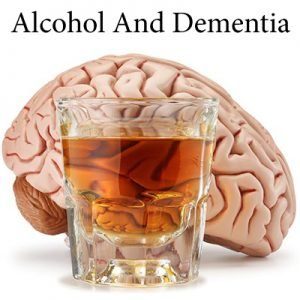Throughout history, alcoholic beverages have been ingrained in many cultures. While moderate consumption might offer some health benefits, chronic heavy drinking can significantly impact your brain health, increasing the risk of dementia. But the good news is, unlike other forms of dementia, alcohol-related dementia (ARD) may be partially or even fully reversible in some cases.
Understanding Dementia and Alcohol’s Impact
Dementia is a broad term encompassing a group of brain disorders that progressively impair cognitive function. This decline affects memory, thinking, reasoning, and behavior, making daily life increasingly challenging. Alzheimer’s disease is the most common form, but alcohol misuse is a significant risk factor for dementia as well.
How Alcohol Damages the Brain

Excessive alcohol consumption disrupts the brain in several ways:
- Shrinks Brain Tissue: Heavy drinking can lead to shrinkage and atrophy of the brain, similar to what’s observed in Alzheimer’s disease. This reduction in brain volume disrupts communication between brain cells, hindering cognitive function.
- Impairs the Cholinergic System: Acetylcholine is a vital neurotransmitter involved in memory and learning. Chronic alcoholism disrupts the cholinergic system, lowering acetylcholine levels and reducing the number of receptor sites for this neurotransmitter. This disrupts communication within the brain, leading to memory loss and cognitive decline.
- Neurotoxicity: Alcohol itself is neurotoxic, meaning it directly damages brain cells. This damage can accumulate over time, contributing to dementia development.
The Potential for Reversal: Hope for Those with ARD
While the damage caused by alcohol can be significant, the brain has a remarkable capacity for healing. Here’s why ARD might be reversible:
- Early Intervention is Key: The earlier you address alcohol dependence and seek treatment, the greater the chance of reversing or slowing the progression of ARD. If you suspect a problem with yourself or a loved one, consult a healthcare professional promptly.
- Brain Plasticity: The brain possesses neuroplasticity, the ability to adapt and form new connections throughout life. By stopping alcohol consumption and engaging in brain-stimulating activities, you can promote the growth of new neural connections, potentially mitigating some of the damage caused by alcohol.
- Nutritional Support: Alcohol depletes the body of essential nutrients, particularly B vitamins, which are crucial for brain health. Addressing these deficiencies through dietary changes and supplementation can support brain recovery.
What You Can Do to Reduce Your Risk and Promote Recovery
- Quitting Alcohol: This is the single most important step. Eliminating alcohol from your system allows your brain to begin the healing process. There are numerous resources available to help with addiction treatment, including support groups, therapy, and medication.
- Nutritional Therapy: A balanced diet rich in fruits, vegetables, whole grains, and lean protein provides the brain with the building blocks it needs to heal. Consider consulting a nutritionist to create a personalized plan that addresses any nutrient deficiencies.
- Cognitive Stimulation: Engage your brain in activities that challenge and stimulate cognitive function. This can include puzzles, games, learning a new skill, or simply engaging in stimulating conversations.
- Exercise Regularly: Physical activity promotes blood flow to the brain, delivering oxygen and essential nutrients. Aim for at least 30 minutes of moderate-intensity exercise most days of the week.
- Quality Sleep: Sleep allows the brain to consolidate memories and repair itself. Getting 7-8 hours of quality sleep each night is crucial for brain health.
Seeking Support is Crucial
Living with ARD or supporting someone with the condition can be challenging. Here are some resources that can help:
- The National Institute on Alcohol Abuse and Alcoholism (NIAAA): https://www.niaaa.nih.gov/ provides a wealth of information on alcohol use disorder and treatment options.
- The Alzheimer’s Association: https://www.alz.org/ offers support groups and educational resources for individuals with dementia and their caregivers.
- The National Council on Alcoholism and Drug Dependence (NCADD): https://ncadd.us/ provides information and resources on addiction treatment and recovery.
Remember, you are not alone. With professional help, lifestyle changes, and a dedicated approach to recovery, you can significantly improve your brain health and potentially reverse some of the damage caused by ARD.
Final Thoughts
By quitting alcohol, prioritizing brain health, and seeking support, you can empower yourself or your loved one to embark on a journey of recovery. The brain is a resilient organ, and with the right approach, you can potentially reverse some of the damage and improve cognitive function.
Disclaimer: This blog post is intended for informational purposes only and does not constitute medical advice. Please consult with a healthcare professional for personalized guidance on alcohol use, dementia risk reduction, and treatment options.
